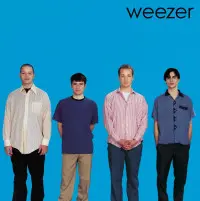Weezer made it safe for nerds in rock music in the '90s.
Rock and roll has always been a cool man's game. Elvis' sexy hip shakin', Mick Jagger's stage swaggering, Robert Plant's vest—with—no—shirt and incredibly tight pants. Cheap Trick provided some relief in the late '70s, but they were only HALF nerds. New wave brought some indoor—types into stardom in the '80s, but the rock stars of the early '90s were all drug—addled long—hairs, like they'd always been. Weezer showed us that geeks CAN rock, but more importantly, the band brought power pop back in a time period full of too much angst and not enough hooks in rock music.
Weezer's rise to mainstream success was surprisingly quick. The band formed in early 1992, signed to Geffen in June of '93 after a rep saw them on a bill with That Dog, and put out their debut self—titled album, universally known as The Blue Album, on May 10, 1994. Geffen didn't plan to put much money or effort into promoting the album, but as "Undone (The Sweater Song)" started getting radio airplay anyway, they had no choice but to roll with it. The Spike Jonze—directed "Undone" video, with dogs swarming the band while they performed, gained traction on MTV. He then created a Happy Days—themed video for the poppy—as—shit "Buddy Holly," which remains one of my all—time favorite music videos, often placing high on critics' lists of the category as well. The ska—flavored soft/loud ballad "Say It Ain't So" became a huge hit as well, and remains a giant sing—along for me and my friends every time we hear it.
The band is essentially a trio on Blue. Original second guitarist Jason Cropper left mid—recording, replaced by Brian Bell. Having little time to learn Cropper's parts, Cuomo is rumoured to have re—recorded all of the guitar parts for the record himself, with Bell simply stepping in on backing vocals. This is amazing to think about when you listen to the epic closer "Only In Dreams," and as it reaches its climactic moment of harmonized guitars realizing that this is Cuomo shredding with himself. Then it's bassist Matt Sharp's chill, memorable line that takes it down to the track's calm finish. Sharp is widely considered by fans to be a huge part of Weezer's early success, not simply in his bass playing, but his falsetto vocals, improvised background injections, the addition of some synths to the Weezer sound, and his personality. He would leave after the band's sophomore album, Pinkerton —— but you all knew that all too well. Drummer Patrick Wilson supplies the feel; he's not a fancy drummer, but his style and the tone of his drums fits the music perfectly. He also has songwriting credits on "Surf Wax America" and "My Name is Jonas." Other than Bell not yet being worked into the mix, Blue is an example of a band with all cylinders firing, something I believe has been lacking in the band's recent years, with songwriting and arranging falling solely on Cuomo's shoulders.
The Blue Album sounds fantastic, and has aged much better than many major label albums of the time. Ric Ocasek, of Weezer's power—pop forefathers The Cars, manned the helm and had a big part in the album attaining that perfect mix of powerful and poppy. In addition, the cover's simple image of the band against a blue backdrop was perfect as well, and remains one of the most memorable album covers of the '90s. The self—titled/color scheme combo has become a running gag within the band's discography of three self—titled albums, blue, green and red.
But back to the music, every single song on this album is perfect. This is the album you put in on a road trip with friends and you yell yourselves hoarse. The words spoke to me then, and they still do today. Lyrically it hit closer to home than grunge, with more straightforward tales of love lost, jealousy and the simple pleasures like playing music "In The Garage" and a (then) modern take on a Beach Boys staple, the surfing song. "The World Has Turned and Left Me Here" will always be a favorite of mine, with its low—end fuzz and picked acoustic over top, pulsing to a finish with layered vocals: "And in your place, an empty space / Has filled the void behind my face" in front of a falsetto descant of "Do you believe what I sing now?", which then fuse together lyrically for a triumphant ending. "Holiday" sways, afloat on a sea of distortion and following a similar successful formula, building to multiple vocal lines climbing higher and higher to the finish.
Whatever you might think of Weezer's output during their second run in the 2000s, The Blue Album is undeniable. Nirvana was great. But alongside the punk explosion, Weezer showed us that a different kind of weird outsider, the almighty nerd, could rock too.
